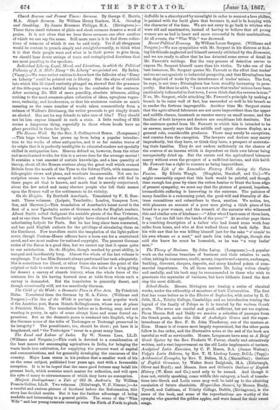School - Books. Messrs. Rivington are issuing a series of classical works,
under the editorship of members of both Universities. The first that has come before us is the Electra of Sophocles, with notes by R. C. Jebb, M.A., Trinity College, Cambridge, and an introduction tracing the legend of the family of Pelops as it is treated. by the various Greek•
poets. The notes are careful and good, sufficient, but not too copious. From Messrs. Bell and Daldy we receive a selection of passages from
the Greek poets, under the title of Anthologia Grceca and the super- intendence of the Rev. F. St. John Thackeray, one of the masters at Eton. Homer is of course most largely represented, but the other poets follow in due order, and the illustrative notes at the end of the book are tasteful as well as serviceable. Messrs. Longmans have sent us A Brief Greek Syntax by the Rev. Frederic W. Farrar, clearly and attractively written, and a vast improvement on the old Latin implements of torture.
Analytical Latin Exercises, by C. P. Mason, B.A. (James Walton); Valpy's Latin Delectus, by Rev. T. H. Lindsay Leary, D.C.L. (Tegg); Arithmetical Examples, by Rev. T. Dalton, M.A. (Macmillan); Outlines- of English Grammar, by Walter Scott Dalgleish, M.A. (Edinburgh, Oliver and Boyd); and Messrs. Ince and Gilbert's Outlines of English History (W. Sent and Co.) need only to be named. And though it
does not, strictly speaking, come within this category, a book of transla-
tions into Greek and Latin verse may well be held up to the admiring emulation of future classicists. Hesperidean Susurri, by Messrs. Brady,
Tyrrell, and Cullinan, of Trinity College, Dublin, (Rivingtons), is the name of the book, and some of the reproductions are worthy of the nymphs who guarded the golden apples, and were famed for their sweet songs.






























 Previous page
Previous page